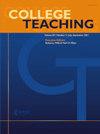了解学生对新作业和传统作业的体验
Q3 Social Sciences
引用次数: 3
摘要
可更新作业是学生创建的具有课程外价值的工件。然而,在理论框架的基础上,对可再生作业进行更多的实证调查是必要的。在这项研究中,学生(N = 69)参与了可更新的作业,并被要求报告他们基于动机自决理论和社会正义原则的看法。总体而言,与传统作业相比,学生们在可再生作业中表现出更高的积极性,也有更多的机会表现自己的身份。选择公开分享的学生比没有选择公开分享的学生表现出更高的能力和亲和力。本文章由计算机程序翻译,如有差异,请以英文原文为准。
Understanding Student Experiences of Renewable and Traditional Assignments
Abstract Renewable assignments are student created artifacts that have value outside of courses. However, more empirical inquiry in renewable assignments grounded in theoretical frameworks is necessary. In this study, students (N = 69) engaged in renewable assignments and were asked to report on their perceptions based on the self-determination theory of motivation and social justice principles. Overall, students reported higher levels of motivation as well as more opportunity to represent their identities for renewable assignments than traditional assignments. Students who opted to publicly share reported higher levels of competence and relatedness than did students who did not opt to publicly share.
求助全文
通过发布文献求助,成功后即可免费获取论文全文。
去求助
来源期刊

College Teaching
Social Sciences-Education
CiteScore
1.50
自引率
0.00%
发文量
33
期刊介绍:
College Teaching provides an interdisciplinary academic forum on issues in teaching and learning at the undergraduate or graduate level. The journal publishes three kinds of articles. Regular, full-length articles of up to 5,000 words reporting scholarship on teaching methods, educational technologies, classroom management, assessment and evaluation, and other instructional practices that have significance beyond a single discipline. Full-length articles also describe innovative courses and curricula, faulty development programs, and contemporary developments. Quick Fix articles, up to 500 words, present techniques for addressing common classroom problems. Commentaries, up to 1,200 words, provide thoughtful reflections on teaching.
 求助内容:
求助内容: 应助结果提醒方式:
应助结果提醒方式:


